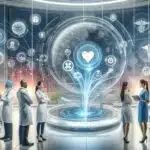The World Economic Forum (WEF) recently released their annual list of the year’s most promising emerging technologies. The “Top 10 Emerging Technologies of 2023” report highlights new technologies that are poised to significantly impact society within the next 3-5 years.
This year’s list features a diverse range of innovations spanning from healthcare to sustainability. The top 10 technologies are:
Flexible Batteries
Thin, bendable batteries that enable flexible electronics like wearables.
Flexible batteries built using thin, bendable materials can enable a new generation of portable and wearable electronics. For example, flexible lithium-ion batteries developed by Apple and LG Chem are enabling smartwatches with curved displays that can wrap around wrists. Researchers are also developing flexible batteries that can integrate into fabrics to power smart clothing.
Generative AI
AI that can create original content like text, images and code.
Generative AI refers to AI systems that can create original content like text, images, videos, code, and more. For example, tools like DALL-E 2 and Stable Diffusion can generate realistic images simply from text prompts. Other systems like GitHub’s Copilot can autocomplete code based on comments. Generative AI could be applied in content creation, drug discovery, computer programming, and more.
Sustainable Aviation Fuel
Lower-carbon jet fuel made from waste biomass or renewable energy.
As air travel grows, sustainable aviation fuels derived from waste biomass or renewable energy can provide lower lifecycle carbon emissions compared to conventional jet fuel. Fuels made from municipal waste, agricultural residues, and direct air captured carbon have already been tested. Wider adoption faces challenges like high costs but could reduce the aviation industry’s climate impact.
Designer Phages
Engineered viruses that can treat bacterial infections.
Phages are viruses that infect and kill bacteria. Designer phages are engineered to fight specific antibiotic-resistant bacteria or deliver targeted genes to bacteria. For example, phages are being designed to kill bacteria that cause food poisoning. Designer phages may enable precision treatments without harming beneficial microbiomes in humans, plants or animals.
Metaverse for Mental Health
Shared virtual spaces for mental health support.
Virtual worlds and augmented reality in the metaverse could provide new platforms for delivering mental health treatment and support. For example, virtual reality exposure therapy is being used to treat phobias and anxiety. Avatars and digital spaces may also facilitate group therapy and counseling. The metaverse offers global reach to address the growing mental health crisis.
Portable Plant Sensors
Devices to monitor crop health and optimize agriculture.
Miniature sensors attached to plant leaves can provide real-time data on crop health and growing conditions. Rather than monitoring fields from satellites or drones, these portable sensors give high-resolution data plant-by-plant to optimize irrigation, fertilizer use and prevent disease. Wider adoption of this technology could boost agricultural productivity to meet future food demands.
Spatial Omics
Molecular-level mapping of biological processes.
Spatial omics involves molecular-level mapping of tissues to visualize where biological molecules are located and interacting within single cells. This emerging field combines AI, genetics, imaging and data analytics to create 3D atlases revealing the complexity of human cells and tissue. Spatial omics can uncover new insights that improve drug discovery and personalized medicine.
Flexible Electronics for the Brain
Soft, flexible circuits to improve brain-computer interfaces.
Developing electronics that are flexible and stretchable could improve brain-computer interfaces and neuroprosthetics. Soft, flexible neural sensors that move with the brain produce better signals than rigid electrodes for mapping brain activity. Such bioelectronics may enable breakthrough treatments for conditions like paralysis and epilepsy.
Sustainable Computing
Achieving carbon-neutral data centers.
Data centers supporting our digital world consume massive amounts of electricity. Sustainable computing focuses on achieving carbon-neutral data centers through renewables as well as improved cooling systems, energy-efficient hardware, AI-optimized workload management, and other innovations. Microsoft, Google and other tech giants are leading initiatives to curb emissions and water use from computing.
AI-Assisted Healthcare
Applying AI to improve healthcare delivery.
Emerging AI and data analytics tools can improve diagnosis, personalized treatments, and delivery of healthcare. For example, AI is showing promise at analyzing MRIs, CT scans, and medical records to support doctors in making quicker, more accurate diagnoses. Researchers are also applying AI and robotics to perform and assist with surgical procedures.
The report provides an in-depth analysis of each technology, including its current state of development, future potential, and possible risks/challenges.
A key focus is assessing the possible global impact of these technologies across dimensions like people, planet, equity, industry transformation, and prosperity creation. The goal is to promote technologies that benefit society broadly.
Reading the WEF’s annual technology list is a great way to stay on top of promising innovations before they hit the mainstream. The early identification of these impactful emerging technologies can help businesses, policymakers, and society proactively understand and guide their responsible development and application.
You can read the full “Top 10 Emerging Technologies of 2023” report on the World Economic Forum’s website.
Posted in Software Development, Technologies





